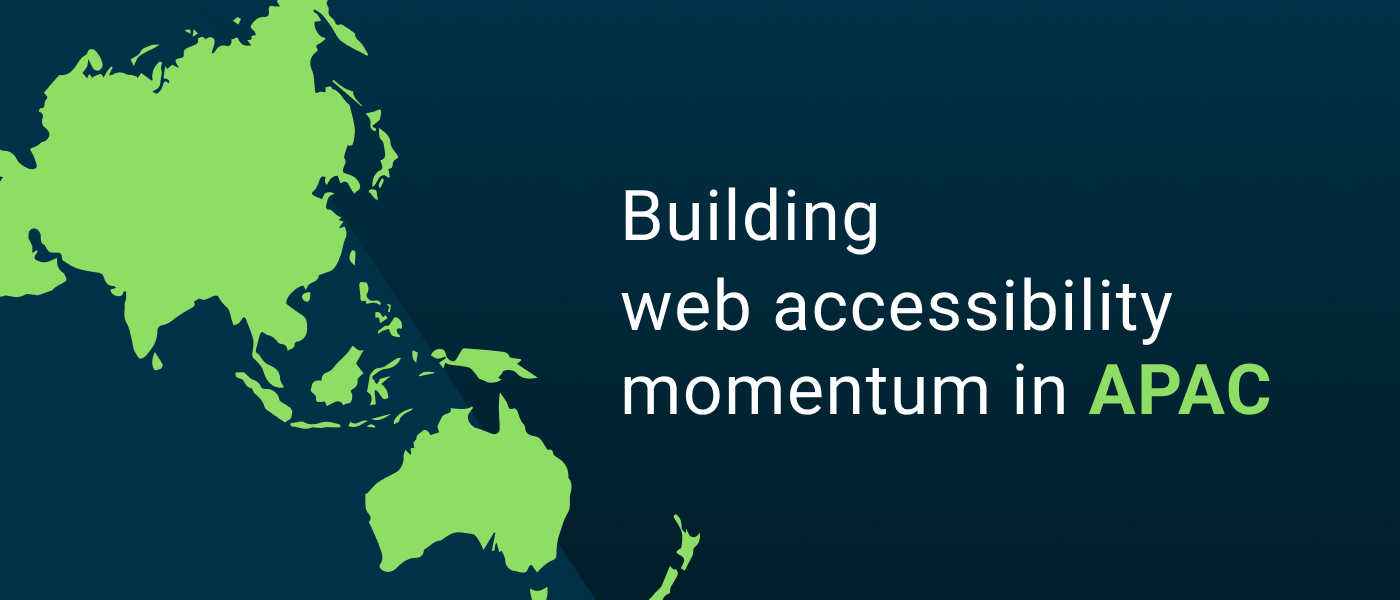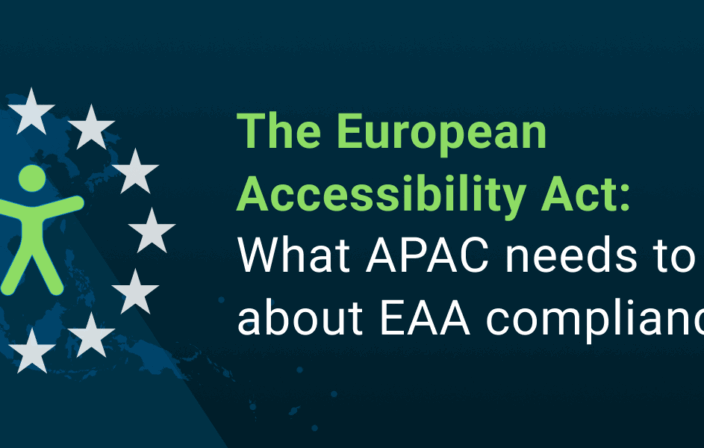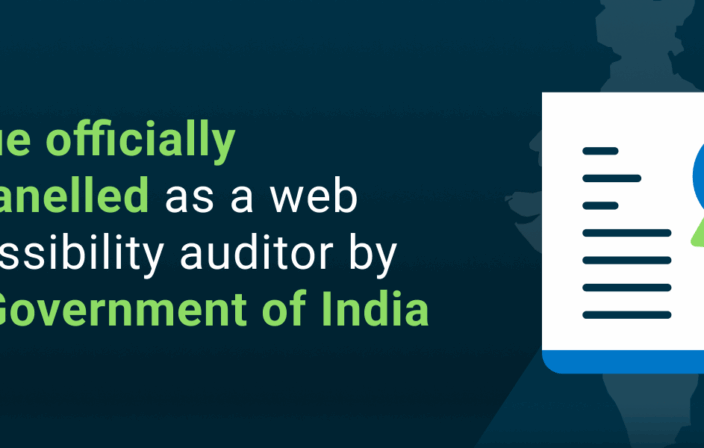While web accessibility is a global issue, every region has unique challenges and opportunities.
According to the World Health Organization, approximately 16% of the world’s population lives with disabilities, and this number is expected to rise with an aging population. Recent numbers from the United Nations confirm that the Asia and the Pacific region (APAC) is home to 60 percent of the world’s population—some 4.3 billion people—and includes the world’s most populous countries, China and India.
Because of its size, web accessibility is a particularly pressing concern for APAC. Fortunately, significant progress is already being made. As organizations increasingly realize that there is a business case for increasing web accessibility alongside ethical reasons, we can hopefully look forward to the acceleration of this progress.
Let’s begin by looking at some laws and regulations already in place.
Accessibility laws and regulations in APAC
Many APAC countries have recognized the importance of web accessibility and have implemented laws and regulations to ensure compliance. For example, Australia has the Disability Discrimination Act, which mandates that websites and digital content be accessible to people with disabilities. In Japan, the newly revised Act on the Elimination of Discrimination against Persons with Disabilities requires public and private organizations to provide reasonable accommodation to individuals with disabilities, including making their websites accessible.
Web Accessibility Laws of South Africa
- Promotion of Equality and Prevention of Unfair Discrimination Act, 2000
- Government Communication and Information System (GCIS) – Website Accessibility
- Africa Law: Ensuring Digital Accessibility for Students with Disabilities
- 3Play Media – South African Accessibility Laws
Web Accessibility Laws of Saudi Arabia
- Personal Data Protection Law (PDPL)
- Legislative Decree No. 106
Web Accessibility Laws of New Zealand
- New Zealand Web Accessibility Standard
- Human Rights Act 1993
Web Accessibility Laws of India
- Rights to Persons with Disabilities Act, 2016
- Bureau Of Indian Standards IS-17802_1_2021 & IS-17802_2_2021
Web Accessibility Laws of Australia
- Disability Discrimination Act 1992
- Web Content Accessibility Guidelines (WCAG) 2.1
APAC is a diverse region with a wide array of cultures, languages, and accessibility needs. From elderly users with declining vision to young individuals with cognitive impairments, there is a need to cater to a broad spectrum of users.
This diversity is a key reason business organizations are increasingly focusing on web accessibility. Let’s examine the business use case.
How web accessibility implementation drives business benefits
Web accessibility goes beyond legal compliance. It also significantly impacts user experience and engagement. By creating inclusive digital experiences, businesses in APAC can build trust with their customers, enhance brand reputation, and drive customer loyalty.
Building trust and credibility
When users encounter an inaccessible website or app, they can feel frustrated and excluded. By prioritizing accessibility, businesses can demonstrate their commitment to inclusivity and make a positive impression on users. This can help build customer trust and credibility, increasing loyalty and repeat business.
Enhancing brand reputation
In today’s competitive landscape, brand reputation is more important than ever. Businesses prioritizing accessibility send a powerful message about their values and commitment to diversity. This can enhance the brand’s reputation and set it apart from competitors who overlook accessibility considerations.
Driving customer loyalty
By providing a seamless and accessible user experience, businesses can foster customer loyalty and build long-term relationships with their user base. Users who feel valued and respected are likelier to return to a website or app, recommend it to others, and become loyal customers.
Market expansion
Accessible products are designed to be usable by a broader range of individuals, including those with disabilities. By ensuring software is accessible, organizations can tap into new market segments, connecting with individuals with disabilities who require accessible technology solutions. This expands the organization’s potential customer base and fosters a more inclusive and diverse user community.
There are additional business benefits beyond the customer-facing items we’ve discussed above.
Competitive advantage
As accessibility becomes more prominent in procurement processes, organizations prioritizing accessibility gain a competitive edge. Demonstrating that their products meet or exceed accessibility standards can set them apart from competitors who may not have invested in accessibility measures. This can be particularly advantageous in industries where inclusivity and compliance are highly valued, such as government contracting or sectors with strong corporate social responsibility (CSR) initiatives.
Alignment with RFP requirements
Many organizations, particularly in government, education, and healthcare sectors, include accessibility requirements in their Requests for Proposals (RFPs). These requirements mandate that software solutions must meet specific accessibility standards to be considered for procurement. By complying with these standards, organizations increase their eligibility for contract bidding and can access a broader market of potential vendors.
Mobile web accessibility in APAC
Mobile web accessibility is particularly crucial in APAC, given soaring mobile adoption rates in recent years.
“In 2022, the smartphone adoption rate across the Asia-Pacific region reached 76 percent, marking an increase from 64 percent in 2019. By 2030, smartphone adoption in APAC was projected to reach over 90 percent.”
source: Statista
At Deque, we recognize that “the explosive growth of mobile apps has led to a proliferation of new ways to create them in complex native and cross-platform environments, which adds multiple accessibility testing hurdles into the mobile landscape.” Among the central challenges is that while the Web Content Accessibility Guidelines (WCAG) are the world’s gold standard, those guidelines were established for the HTML web and not for native mobile. Fortunately, with tools such as Deque’s axe DevTools Mobile, businesses can efficiently reproduce, research, and remediate accessibility issues.
The future of web accessibility in APAC
We’re heartened to see momentum around web accessibility in APAC continuing to accelerate. The increased focus on business opportunities is driving this momentum.
When the Economic and Social Commission for Asia and the Pacific (ESCAP) issued their most recent Disability at a Glance report, for example, their chosen focus topic was “Disability Inclusion in Business.”
Among the significant developments the report highlights is the adoption of the Jakarta Declaration on the Asian and Pacific Decade of Persons with Disabilities, 2023–2032 by the United Nations Economic and Social Council:
“The Jakarta Declaration on the Asian and the Pacific Decade of Persons with Disabilities, 2023–2032, adopted by the United Nations Economic and Social Commission for Asia and the Pacific (ESCAP) in October 2022, is the latest commitment of Governments in the region. The Jakarta Declaration recognizes the potential of disability-inclusive business and calls on the engagement of the private sector as a key change agent.”
Conclusion
We’ll conclude with two influential observations from the Disability at a Glance 2023 Catalysts of Change: Disability Inclusion in Business in Asia and the Pacific report. The first surfaces the financial opportunities businesses risk missing out on by failing to include persons with disabilities:
“A study of 10 low- and middle-income developing countries in Asia and Africa conducted by the International Labour Organization (ILO), found that the exclusion of persons with disabilities from the labour force can lead to an economic loss ranging between 3 and 7 percent of the gross domestic product (GDP).”
The second item spotlights something the report refers to as a “silver economy”:
“In Asia and the Pacific, rapid population ageing is resulting in increased disability prevalence as functions decline. Among persons aged 60 years and above, 46 percent experience some form of disability. The “silver economy” alone is estimated to be worth $4.56 trillion in Asia.”
Web accessibility matters in APAC more than ever before. By prioritizing accessibility, businesses in the region can reach a diverse audience, comply with legal requirements, and enhance the overall user experience. In doing so, organizations can ensure they’re on the right side of history morally and ethically while simultaneously ensuring robust business health as well.
The opportunity is real. The time is now.


